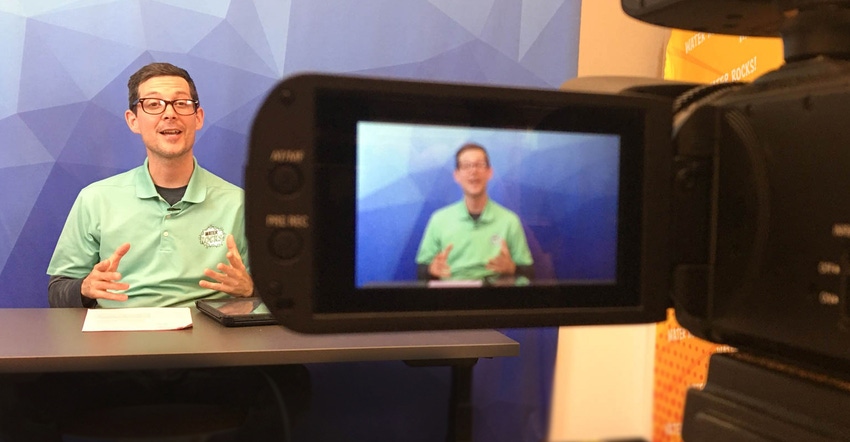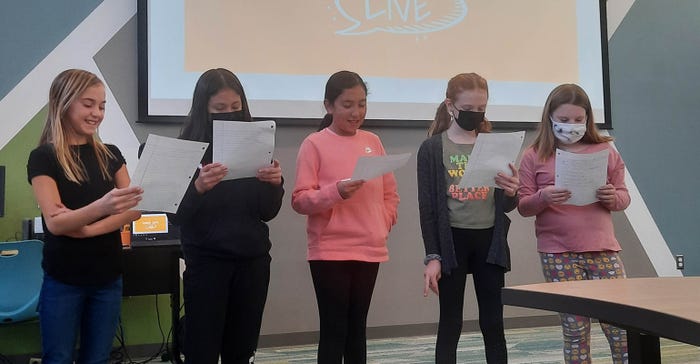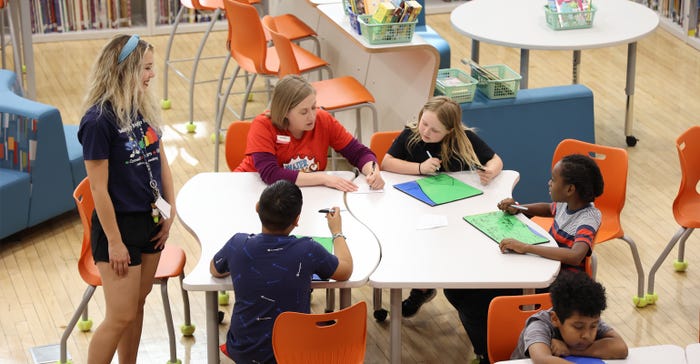August 16, 2022

The Water Rocks! youth water education program from Iowa State University Extension and Outreach has continued to excel in reaching Iowans despite some of the challenges presented by the COVID-19 pandemic.
During this 10th year for the program, Water Rocks teams engaged with a total of 9,702 students during the 2021–22 school year, all while facing a dramatically altered educational landscape compared to prepandemic years.
“Our total number of young people served has not yet recovered to prepandemic levels, primarily due to restrictions on large-group assemblies in most schools, but we were thrilled to engage with nearly 10,000 students this past year,” Ann Staudt, Water Rocks director, says. “Between in-person school visits, livestreamed virtual presentations and spoken word poetry workshops, the innovation and experimentation within the Water Rocks program has strengthened and broadened its scope for the future.”

SHARING: Western Hills Elementary School in West Des Moines is ready to share their original poems during a Spoken Earth workshop.
In schools, livestreamed workshops and Water Rocks lessons covered broad natural resources topics including watersheds, wetlands and pollinators. Lessons were ‘personalized’ to the school, classroom and region of the state as appropriate to help grab the attention of the students and enhance learning.
In-person school visits accelerated during the spring semester, concluding the school year with visits to 68 schools, delivering 227 presentations to some 5,144 students. Using the concept of “bringing the field trip to the school,” Water Rocks gets students up on their feet and participating in interactive, science-based lessons and games that have proven to increase learning and information retention throughout Water Rocks’ history.
During the winter months, Water Rocks connected to 68 schools through livestreamed classroom visits, delivering 178 classroom presentations to 3,919 students. The lessons incorporated online documents to facilitate student and teacher interactions with presenters and allow active participation in the lessons. Teacher feedback from these visits indicated that students were engaged and excited by the virtual visits in much the same ways as their peers who received in-person visits.
Presentations make discussion continue
Teacher evaluations received after visits suggest that Water Rocks presentations serve as a springboard for deeper discussion of natural resources and foster interest by young people in engaging on issues related to Iowa’s water, land and wildlife.
“We noted an interesting phenomenon when comparing teacher feedback between in-person and livestreamed visits,” Staudt says. “It seems that student discussions after in-person visits trended toward lesson content, games and what they learned during the session; while after virtual visits, the discussions often turned toward taking action to address local issues. Of course, we want all students to learn and act, so these are positive outcomes that may or may not be directly related to the delivery method.”

LEARNING: McKinley Elementary School students in Des Moines learn about watersheds through the interactive Rock Your Watershed Game.
The Spoken Earth experimental workshops were a new addition to the Water Rocks repertoire this year. The workshops, co-led by Water Rocks team members and a professional spoken word artist, interleaved arts and science in a fast-paced interactive session for students in grades five to 12. Through a combination of in-person and online visits to 12 schools, 32 sessions involving 639 students were held.
“Incorporating science, poetry, literature, art, popular culture and advocacy, Spoken Earth gives students an opportunity for expression of their feelings and thoughts about conservation and environmental concerns in an open and supportive format,” Staudt says. “Even though the workshops were still in the experimental stage and time-limited to 40 minutes, the student poetry was awe-inspiring. As we continue to develop the Spoken Earth program, we are eager to see what might happen next.”
To learn more about Water Rocks or view the annual report, visit waterrocks.org.
Teacher comments
In-person visits
The interaction between presenters and students was awesome! A couple kids who are pretty quiet were very engaged so that was very exciting! (Fifth grade teacher, Grundy Center Community School District)
I loved the visuals, games, and the enthusiasm of the presenters. [The class] loved hearing the facts about each living thing. (Fourth grade teacher, North Mahaska Community School District)
Livestream visits
I liked how it fit so well with our third-grade science standards. After the visit, students talked about the need to plant plants around our school to attract pollinators. (3rd Grade Teacher, Colo-NESCO Community School District)
Afterward, students talked about how we can remediate the water pollution problem. We looked up images of Dubuque’s watershed to see where each of us lives. (Eighth grade teacher, Eleanor Roosevelt Middle School, Dubuque)
Spoken Earth workshop
We need to be doing more of this type of integration of art and science — and with Spoken Earth, the synthesis was already happening. Many of the kids who participated … were science-oriented, and the structure of the workshop made it easy for them to quickly grasp the environmental content, but it also allowed them the freedom to apply their own creativity. (Karen Downing, language arts teacher, Valley High School)
Each [10th–12th grade] student wrote an original poem on a theme of conservation or water use in Iowa. It was neat to see them get into it, and I was very pleased that so many of them were inspired to write and express their feelings. (Blythe Stanfel, creative writing teacher, Valley High School)
Stevenson is a visual outreach specialist and conservation educator with Iowa Learning Farms and Water Rocks at Iowa State University Extension and Outreach.
Water Rocks is Iowa’s unique, award-winning statewide youth water education program. Through a combination of STEM and the arts, especially music, Water Rocks educates, challenges and inspires young people toward a greater appreciation of our state’s water, soil and other natural resources. Partners of Water Rocks include: Iowa State University Extension and Outreach, Iowa Department of Natural Resources (United States Environmental Protection Agency, Section 319 of the Clean Water Act), Leopold Center for Sustainable Agriculture and personal gifts of support.
You May Also Like




